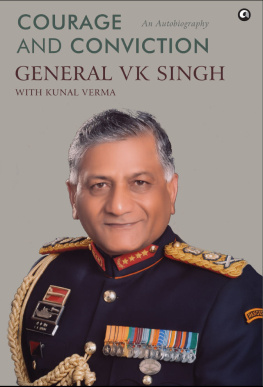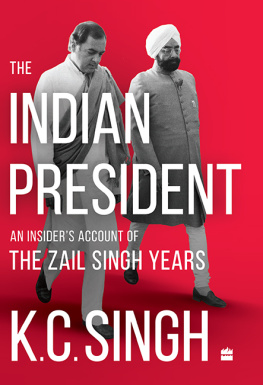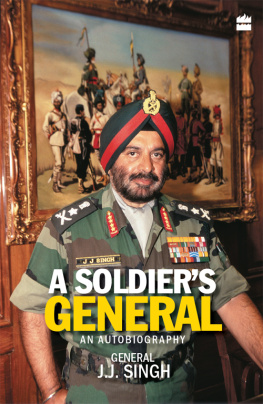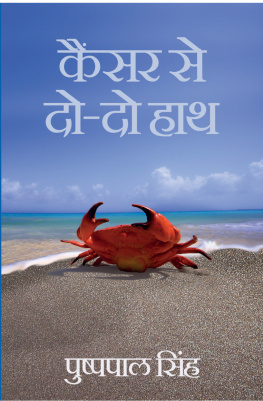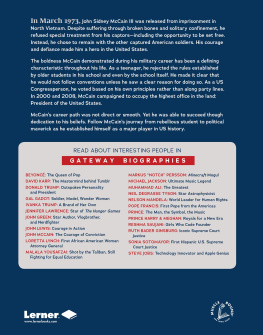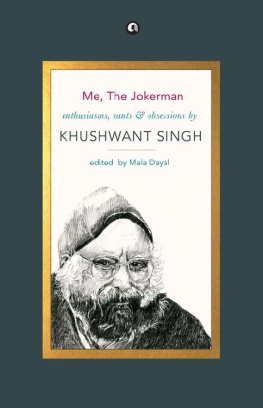Gen. (Retd. V.K. Singh) - Courage and Conviction
Here you can read online Gen. (Retd. V.K. Singh) - Courage and Conviction full text of the book (entire story) in english for free. Download pdf and epub, get meaning, cover and reviews about this ebook. year: 2013, publisher: Aleph Book Company, genre: Non-fiction. Description of the work, (preface) as well as reviews are available. Best literature library LitArk.com created for fans of good reading and offers a wide selection of genres:
Romance novel
Science fiction
Adventure
Detective
Science
History
Home and family
Prose
Art
Politics
Computer
Non-fiction
Religion
Business
Children
Humor
Choose a favorite category and find really read worthwhile books. Enjoy immersion in the world of imagination, feel the emotions of the characters or learn something new for yourself, make an fascinating discovery.
- Book:Courage and Conviction
- Author:
- Publisher:Aleph Book Company
- Genre:
- Year:2013
- Rating:4 / 5
- Favourites:Add to favourites
- Your mark:
- 80
- 1
- 2
- 3
- 4
- 5
Courage and Conviction: summary, description and annotation
We offer to read an annotation, description, summary or preface (depends on what the author of the book "Courage and Conviction" wrote himself). If you haven't found the necessary information about the book — write in the comments, we will try to find it.
Courage and Conviction — read online for free the complete book (whole text) full work
Below is the text of the book, divided by pages. System saving the place of the last page read, allows you to conveniently read the book "Courage and Conviction" online for free, without having to search again every time where you left off. Put a bookmark, and you can go to the page where you finished reading at any time.
Font size:
Interval:
Bookmark:

About the book
General V. K. Singh served in the Indian Army for forty-two years, retiring as Chief of Army Staff on 31 May 2012. His distinguished career saw him on the front lines of combat in the Indo-Pak War of 1971 which led to the creation of Bangladesh and in Sri Lanka as part of the Indian Peace Keeping Force. Considered one of the worlds foremost experts in counter-insurgency operations, he is also known for the principled stand he took on many issues during his tenure, from arms procurement to the deployment of the army against the Maoists.
Trained at the National Defence Academy and the Indian Military Academy, VK Singh served in regions (and in roles) crucial to Indias security. From his early days as company commander on the Line of Control in Poonch, to commanding elite formations Victor Force in Jammu and Kashmir and the vast Eastern Command that shares international boundaries with Nepal, Bhutan, China, Myanmar and Bangladesh to his experience of military operations and exercises such as Blue Star, Brasstacks and Trident, General Singhs story makes for fascinating reading. Candid, compelling and occasionally controversial, this is the story of a straight-talking soldier not afraid to stand by his convictions
About the author
A third-generation army officer, General V. K. Singh served with both the 2nd and 25th Battalion of the Rajput Regiment. A highly decorated soldier, he was the twenty-fourth Chief of the Indian Army. In the course of his tenure he took a principled stand on multiple issues and this often brought him into conflict with powerful lobbies both inside and outside government. Writer and filmmaker KunalVerma has produced many critically acclaimed films for the Indian armed forces that include The Standard Bearerson the NDA and a documentary on the Kargil War. He has also authored The Long Road to Siachen: The Question Why and the Northeast Trilogy.

ALEPH BOOK COMPANY
An independent publishing firm
promoted by Rupa Publications India
This digital edition published in 2013
First published in India in 2013 by
Aleph Book Company
7/16 Ansari Road, Daryaganj
New Delhi 110 002
Copyright General (Retd) Vijay Kumar Singh 2013
No part of this publication may be reproduced, transmitted, or stored in a retrieval system, in any form or by any means, whether electronic, mechanical, print reproduction, recording or otherwise, without the prior permission of Aleph Book Company. Any unauthorized distribution of this e-book may be considered a direct infringement of copyright and those responsible may be liable in law accordingly.
e-ISBN: 978-93-83064-46-5
All rights reserved.
This e-book is sold subject to the condition that it shall not, by way of trade or otherwise, be lent, resold, hired out, or otherwise circulated, without the publishers prior consent, in any form or cover other than that in which it is published.
Dedicated to
Bharti,
who embarked on this journey with me.
Our daughters,
Mrinalini and Yogja,
whose love and affection made this possible.
And
to all the brave men and officers of the Indian Army
whose unflinching support and courage
enabled me to soar.
Few men for the right cause brave the disapproval of their fellows, the censure of their colleagues and the wrath of their society. Moral courage is a rarer commodity than bravery in battle or great intelligence. Yet it is the one essential, vital quality for those who seek to change the world which yields most painfully to change.
The Day of Affirmation Speech, Robert F. Kennedy
The Indian Army flag fluttered on the gleaming black bonnet of the car as we raced through the manicured roads of New Delhi. I looked at my watch, and realized we would be a few minutes early for the meeting with the Minister for Home Affairs. I told my aide-de-camp Captain Prakash to tell the pilot vehicle to slow down slightly.
A week after I had taken over as the Chief of Army Staff (COAS), Naxalite-Maoists owing allegiance to the outlawed Communist Party of India (Maoist) ambushed and killed seventy-six jawans from the Central Reserve Police Force (CRPF) near Chintalnar village in the Dantewada district of Chhattisgarh. Nearly eighty men had made up the CRPF/police team that had been on an area domination exercise in the Bastar tribal region, an area rich in natural resources.
Like the rest of the country, all of us at Army Headquarters were saddened by the incident and the tragic loss of lives. This was one of the bloodiest attacks ever on our security forces, and by the end of the day we had a fair idea of how the CRPF boys had walked into an ambush. The next day, at an interaction with the press, I was asked how a large party of armed jawans could be completely annihilated. After expressing my outrage and the armys solidarity with our fallen comrades, I said it hardly mattered if it was the Border Security Force (BSF), the Assam Rifles, the Indian Army or the CRPF; for any ambush to succeed so dramatically, the organization concerned had to look within itself and review training and operating procedures. Even though this was not on the agenda of the media interaction, the press latched on to this remark and sensationalized the comment, saying, Army chief faults the training of the CRPF.
In the ensuing days, the Ministry of Home Affairs seemed to feel I had encroached on to its turf and there were indications that they were none too happy about my comments (although subsequent findings of the inquiry commission fully supported what I had said). This discomfort was possibly aided by the fact that there was much talk around this time, at various levels, about the armys possible deployment against the Naxalite-Maoist movement. (Though keeping a close watch on the Naxalite-Maoists, the army was not yet directly involved in any way.)
Three weeks had passed since the Dantewada massacre. Owing to various other commitments, the meeting with the home minister had remained pending. Prior to joining politics, Palaniappan Chidambaram had been a corporate lawyer. He had been a key member of the previous two Congress governments. In the wake of the Mumbai terror attack in 2008, Chidambaram had been made the Minister for Home Affairs. Upon taking office, he had promised to tackle the Naxalite-Maoist insurgency on a war footing. With the latest setback hanging in the air and my perceived stepping on their turf, I was pretty certain that the official call on the minister would be coloured by the Dantewada event.
The vehicles stopped outside North Block and the security staff led me to the office of the minister. I was ushered in and greeted the minister who was, as always, attired in his trademark crisp whites. He courteously led me to the sitting area at one end of the room.
So how are things with you, General?
All well with the army, Honble Minister.
Without beating about the bush, Chidambaram came straight to the point. You know the Naxal problem is a major national issue. So why do you oppose the deployment of the army in Naxal areas?
This confirmed my fear that the government was indeed considering asking the army to deploy in the heartland of India. The minister was looking at me intently, a half smile on his lips. For me, it was the moment of truth. Any half-baked answer would open the door. I am fully aware of the situation on the ground, Minister. It is a socio-economic and governance issue and needs to be addressed accordingly. At the same time, this is not a secessionist movement and it would not be correct to use the army against our own people.
Font size:
Interval:
Bookmark:
Similar books «Courage and Conviction»
Look at similar books to Courage and Conviction. We have selected literature similar in name and meaning in the hope of providing readers with more options to find new, interesting, not yet read works.
Discussion, reviews of the book Courage and Conviction and just readers' own opinions. Leave your comments, write what you think about the work, its meaning or the main characters. Specify what exactly you liked and what you didn't like, and why you think so.

